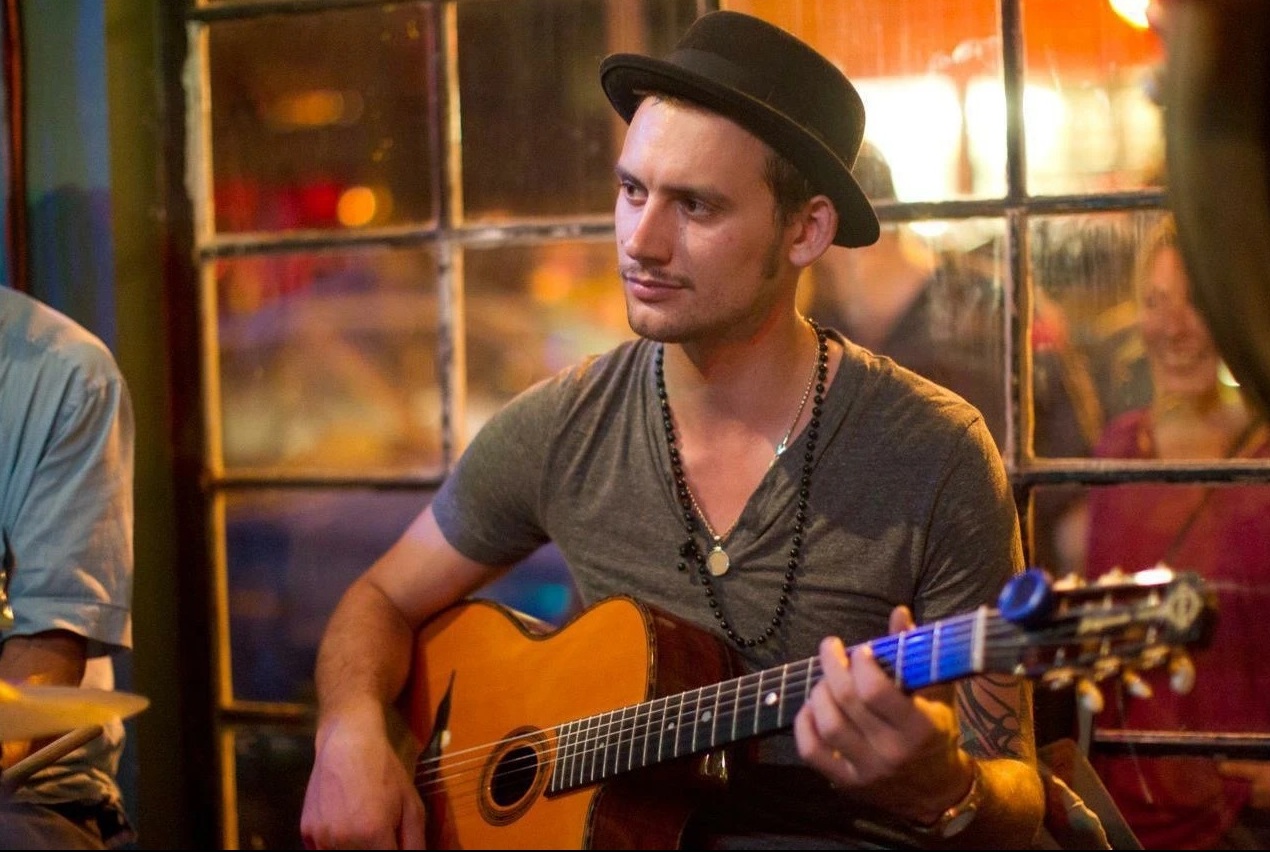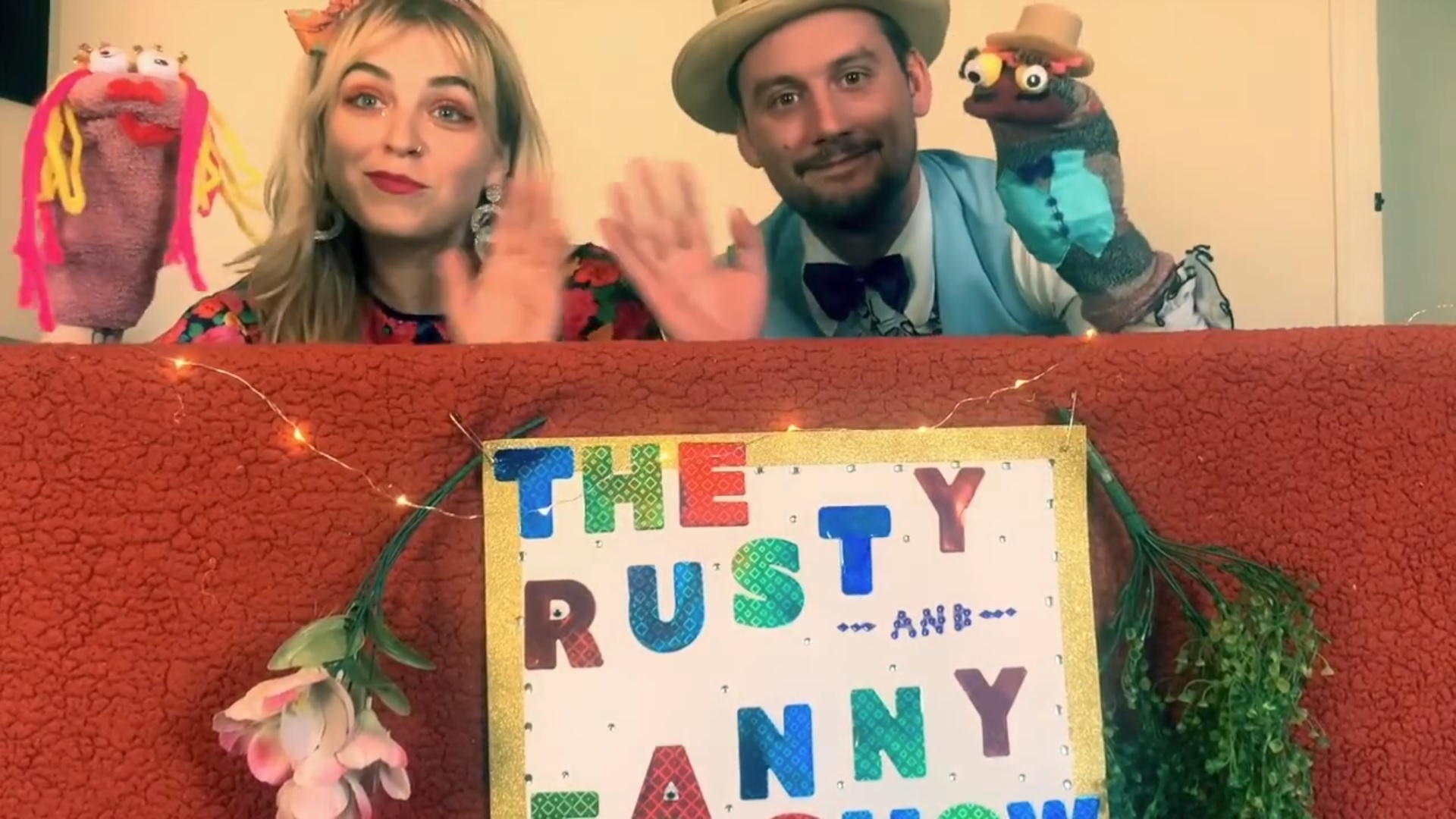The Django a Gogo Festival is held every year in Maplewood, NJ, hosted by acclaimed French musician and composer Stephane Wrembel. The Grammy-winning guitarist has released over a dozen critically acclaimed albums, including a series in tribute to Reinhardt under the nom de plume The Django Experiment. His festival assembles some of the finest Django disciples in the world to celebrate the sinti guitar style, performing at prestigious venues including Carnegie Hall.
Suffice to say, the festival’s organizers know a good guitarist when they see one. So when they describe Russell Welch as “one of the finest Django-style players in the world,” you know that assessment carries weight. But this doesn’t mean Russell spends his days listening to Reinhardt on repeat, trying to copy as closely as possible—Django a Gogo makes a point of promoting “reinterpretation, improvisation and interplay between musicians from various backgrounds” in its celebration of the manouche master—an approach Russell shares.
The Little Big Horns guitarist—who has previously played in punk, classic rock and metal bands—has very catholic tastes in music. He just finds playing jazz “the most fun.” He told me more about his influences and his priorities via video call from his adopted home of New Orleans. Russell picked up his love of the genre from his parents while growing up in Jackson, MS. “My father played banjo, guitar and trumpet,” he said. “But I also went to a Mississippi public school, where jazz was the worst thing you could listen to.”
Russell pushed through the peer pressure and took up blues guitar, learning from a “great teacher” called Barry Leach. He also began hanging out with other musicians. “That interaction ended up being the most fun thing in the world,” he said. It inspired him to take his lessons further, completing a degree in jazz studies at the University of Southern Mississippi—but he found that making a formal study of jazz sucked some of the fun out of it. “It began to feel too academic, and I stopped,” said Russell. “I spent a while in bands which were trying to be the Beach Boys or the Beatles, then I started seeing videos of kids playing manouche style and thought, ‘Wow, this is brilliant.’”
He devoted himself to Django Reinhardt’s music, even learning to play with the same two fingers Reinhardt had on his right hand—“I did learn the ‘Minor Swing’ solo with two fingers, just to do it.” It was a way of resetting his relationship with music, Russell explained. “It was a challenge, a way of starting over,” he said. “It was different from what I’d done before—school every day and gigs every night, playing the same things over and over. Learning manouche made jazz personal to me—it became a passion again.”
After a while, Russell wanted to make the style even more his own. “After school I started playing with all of my fingers and developing a new muscle memory,” he said. “And then it became more personal to me. I taught myself like I was young again and it was all from the heart. Manouche got me out of the academic way and suddenly I felt like I wanted to compose.” In composing his own jazz, Russell drew from his broad interests and experience in other styles.
His output to date has included classic manouche tracks recorded straight to acetate, waltzes and a “jazz ballet” called Silk and Smoke—incorporating influences like Rachmaninov and Chopin, but all with that distinctive Parisian flavor. “I don’t listen to a lot of classical, but I listened to Chopin and Rachmaninov over and over for this,” he said. “We needed twenty minutes of music and Gretchen [Erickson] was going to do modern dance to it. There’s a fugue in there and some classical things, but also gypsy jazz.” The performance has appeared at several festivals and been shortlisted for several awards.

Russell’s collaborators—like fiddle and saw player Dr. Sick, who played with him on Silk and Smoke as well as backing his New Orleans bands—have similarly diverse passions. “Sick is all about the Seattle sound,” said Russell. “What we do is about respecting the melody someone composed but, in the middle when you’re improvising, maybe you go somewhere else for a second. If someone says we’re going here, go there and don’t be afraid. That’s the spirit of improvised music and jazz.” Little Big Horns vocalist Meschiya Lake also brings her own diverse experiences. “She’s from Dakota, she traveled with the circus, so she’s doing something original as well,” Russell added. “She has her own thing, too.”
In his experience, listeners always reacted positively to his outfits, which include Shawarma Hot Trio and The Russell Welch Hot Quartet, mixing things up. “If you listen to a 1930s recording, they’ve done everything but the song,” he added. “There’s flutes, violins—it’s just a platform for improvisation with your friends. So you won’t ever be exactly like a big band in the 1930s, but you will create something new every night. And the audience like that. It’s a platform to express yourself responsibly and have a little danger.”
That same attitude—Russell calls it a “philosophy”—was shared by the man himself, he went on. “Django barely played the melody of anything,” he said. “But he still respected the songs.” Those songs are still an essential part of the canon and the culture, the composer added. “If someone comes to New Orleans and asks me what they should learn to play I say, ‘Go to Wikipedia, find out what the top songs of the 1920s and 1930s were, and learn them—but then mess with it. Get a synthesizer. Play around with it until there’s a thing going on. Lots of New Orleans jazz people have really out there side projects. That keeps things alive. That’s a nice way to compose and make new music within an old style.”

I asked Russell to elaborate on what “jazz” means to him. “That’s a huge question,” he replied, before taking a few moments to plan his answer. “I live in New Orleans,” he began. “I lived in Jelly Roll Morton’s childhood home. Now I live in Danny Barker’s childhood home. But I grew up playing the blues in Mississippi, so I’m not pretending to be an ambassador of this music. But I go hang out with friends who are nerdy, like I am, and when we start playing then we’re in a relationship—we’re improvising. It comes from love. It’s about community. It’s cultural.”
Russell certainly has plenty of respect for that culture, and for its elders—he’s met them, learned from them and gigged with them. “That’s very important to me,” he said. “I’ve traveled all over, met some of my heroes and got to play with them. It was great. I played with Fapy Lafertin—he’s one of the guys now who’s closest to Django’s style. To go to his house, play gigs with him, that was my favorite part.” He added: “Raphaël Faÿs is another one of my heroes and I got to play with him, which was amazing. I can’t top the way they play—that’s why I put a little bit of where I’m from in my music, too.”
That being said, Russell doesn’t feel it necessary to travel too far, when he lives in the crucible of jazz. “I haven’t toured that much until this year, when I’ve been to a couple of Django festivals,” he said. “When you’re in New Orleans you don’t tour much, because the tour comes to you. It’s the best place in the world, for the music I play.” It certainly keeps him busy. “I walk two blocks and play for ten hours straight, like I did last night,” he said. “People are dancing, the music is beautiful.” He’s not resting on his laurels, however. “It’s great when people clap, but I’m not looking at the people applauding,” said Russell. “I’m looking at the drummer who’s saying, ‘You were better last night.’ That’s what I’m chasing.”
He likes the idea of doing more festivals honoring Reinhardt, especially in Europe—but he would also like to share his own music. “My aspiration is to make more original music, find a band which wants to tour a bit and go on tour all over the world,” Russell said. “I really like composing music and sharing it with people.” To create and collaborate is to embody the spirit of jazz, he explained. “I like to improvise and make beautiful music with friends,” he added. “Jazz music is that, for me. It’s philosophical. It cuts down to the basics. It’s about creating joy and being human with other humans—not a lot of people get to do that, and I’m honored that I do.”
Visit Russell Welch online at www.russellwelch.com and find his albums on bandcamp.
Dave Doyle is a swing dancer, dance teacher, and journalist based in Gloucestershire, England. Write him at davedoylecomms@gmail.com. Find him on Twitter @DaveDoyleComms.






















